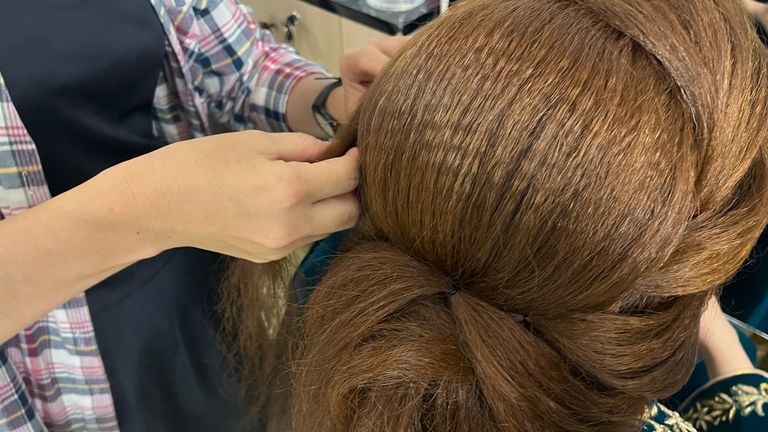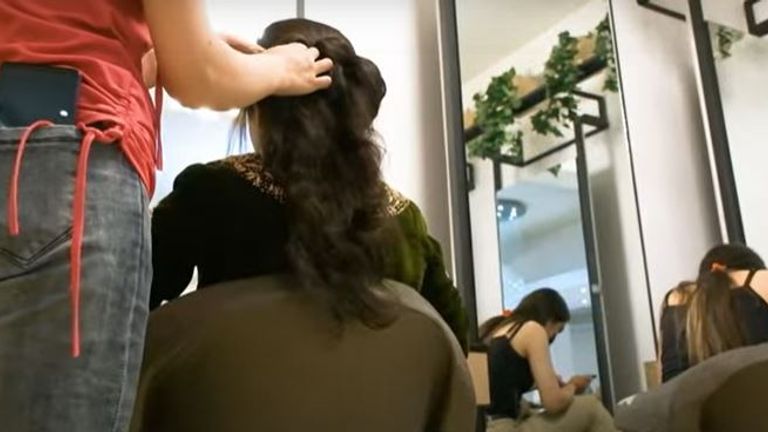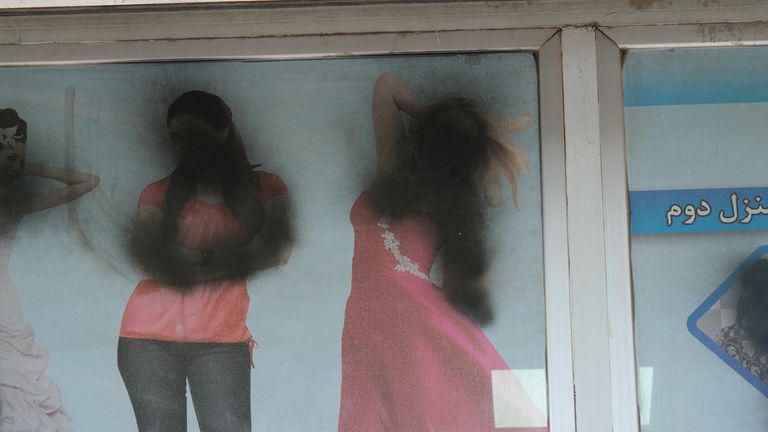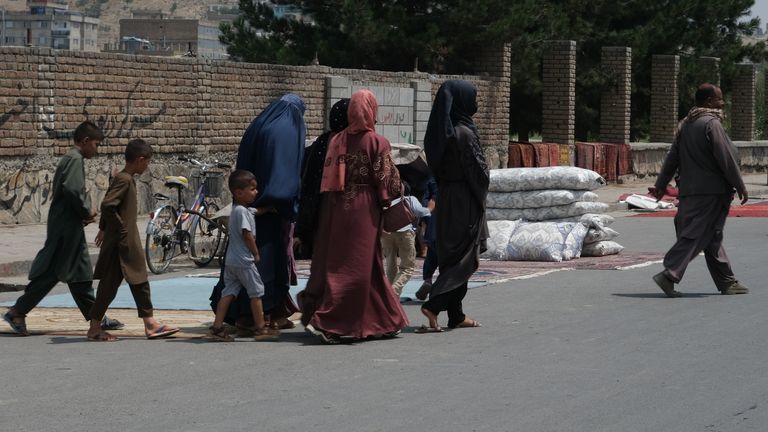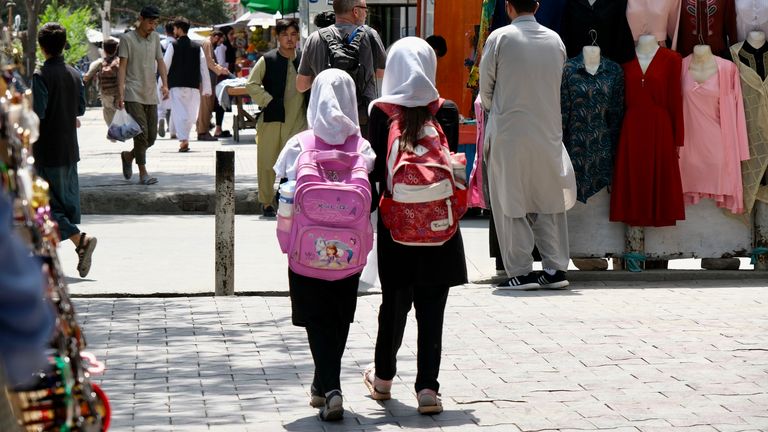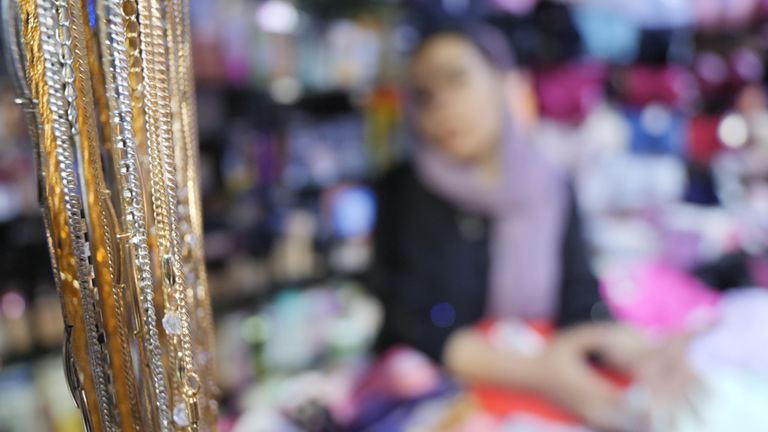We drove along Butchers Street in Kabul, the stripped carcasses of lamb and goat hanging on meat hooks swaying in the wind, gaggles of men argued over prices and butchers boys heaved the meat onto their backs and delivered them to waiting trucks.
At the end of the street, an intersection marked the end of the meat market and the start of a series of colourfully painted buildings.
The names of the beauty shops somewhat gave the game away.
We pulled over and it was agreed that Sky producer, Dominique van Heerden, would go over and have a peek inside.
We had agreed with the owner of one of the salons that Sky News could come and film and interview her, but we were early.
The caveat was that only Dominique could go inside.
The Taliban have decreed that no men, under any circumstances, can ever go inside the parlours.
One assumes they believe the pathway to eternal damnation begins in a beauty parlour.
Dominique is a top producer but for this mission she was to be producer, reporter and camera operator – so she needed to see what it was like and come back to discuss with our regular camera operator, Toby Nash, what equipment she might need.
We watched as she crossed the road, head to toe in a black abaya and shawl, and disappeared behind a billowing curtain.
A few moments later she reappeared.
“It’s rammed with women inside,” she said. “And they are in skinny jeans, T-shirts, and high heels… I wasn’t expecting that!”
Armed with camera, phone and microphones she bade us goodbye and disappeared behind the curtain once again.
It felt like another world – Dominique recounts what she sees inside
Even before I stepped through the dark curtains separating the beauty salon from the street, I could hear the excited voices of women chatting away as hair dryers competed with the sound of music playing in the background.
It felt like another world – one where women were free to be themselves for a time.
I noticed the first thing they all did when they arrived was whip off their black abayas and niqabs and hang them in a cupboard behind a counter displaying hair extensions and beauty products for sale.
One group of young women were getting ready for a wedding.
They were wearing traditional, colourful Kuchi dresses and ornate jewellery and headwear, with sparkly high heels.
They didn’t want to openly talk on camera, but excitedly told me about the upcoming wedding celebrations – one of their brothers was getting married.
The salon’s owner, a confident, strong woman, walked around the room chatting to customers and barking at staff. She runs this business as a no-nonsense, hard-headed entrepreneur.
I wasn’t allowed to film any of the customers or beauticians’ faces, so when I asked the owner for an interview and she casually said yes, I suggested how we could do it anonymously.
“No,” she said defiantly. “I’ll talk like this, I’m not afraid.”
After trying to convince her that maybe it wasn’t a good idea not to cover up, I realised that it wasn’t a discussion, she wanted to be on camera and say her piece.
She is the main breadwinner for her family and this salon is open with the government’s permission.
When the Taliban entered Kabul this time last year, the beauty shop windows filled with pictures of some of the most famous models and products in the world were immediately painted over or ripped off.
Owners like her were unsure what this meant, and the beauty shops temporarily shut.
“In the first week we were scared and worried because we had no permission,” she said. “After a week we opened the salon and they told us that we don’t have permission to work, and that we should close it, so we went home.”
She said after a few days the Taliban came back and told her she could reopen with some restrictions.
“They said that we must wear the hijab with the black veil, and should have long scarves, and that our faces should be covered.”
The salon’s relationship with the Taliban’s morality police is tense.
She knows they hold all the power and that they could shut down her business at any time.
But she’s also worried about the economy.
She doesn’t have as many customers as she once did, mainly, she says, because many women are out of work and can no longer earn and spend money as they wish.
“No one has money now, women had work and were able to fulfil their own needs before. They were doing their nails or their hair colour but now everyone is locked in their homes,” she explained.
“Their husbands now only pay for their food and other essential needs; they don’t give extra money to their wives for treatments.”
Women angry and scared for their futures, Stuart says
Over the past 20 years, a new generation of educated and ambitious women have grown up in Afghanistan expecting a lot more than the Taliban’s archaic sense of order.
They’re angry and scared for their futures, but determined.
We won’t identify her, but we met a 22-year-old working in her family shop who wanted to speak to us. She is about to finish her degree in Russian and has no intention of staying once she’s done.
“If this government stays, I will leave my country to further my education, and I will not come back while this government exists here,” she said.
It struck me that she was a similar age to my daughter, and I couldn’t help thinking how fortunate my daughter is to have so much freedom to study and choose what she wants to do with her life.
I wondered what this young Afghan woman would say to her if they ever met.
“My message to her would be never surrender [your independence], be free and live in freedom as much as you can, don’t be imprisoned, and if your government is extreme, don’t put up with it.”
A few shops away we met another university student who wasn’t afraid to speak to us.
“They should give us space and give us a chance to work, to get an education and to move forward with our lives. If they don’t let us work or go to school, for us women it’s like being in prison.”
She, like many here, feel their life of potential has been stolen from them.
“I used to be very happy and had plans for my life, but not now, I have nothing planned now, and don’t know how to spend my days and nights now we have no education, and no goals.” She told me everyone is depressed.
Amongst the poorest sections of society, women are disproportionately affected by the economic crisis here.
It’s a common sight in Kabul now – women and children waiting outside bakeries in the early evening.
Wealthier customers leave extra money, and bread is handed out at the end of the day.
We watched these scenes unfold outside a bakery in a wealthier area of Kabul.
Women and children at first sitting quietly waiting for the baker to give them something, then desperately grabbing what they could when he came out with the bread.
It’s demeaning and we are told many intentionally wear burqas to hide their embarrassment and identity. They don’t want their friends and neighbours to know they are here.
The Taliban’s old guard believe this is sustainable, but the new generation know Afghanistan will remain cut off and sanctioned until it changes.
With the economy in freefall, Afghanistan is desperate for outside help, and that may be the only hope women here have.


